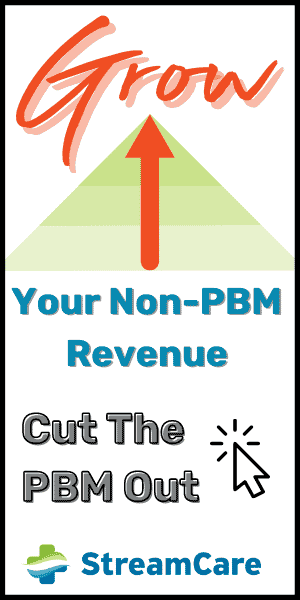Are you ready for your next BOP or DEA controlled drug inspection? Ensure you are with C2 Keep’s innovative controlled drug recordkeeping solution.
Are you 100% sure you are performing all requirements to maintain compliance with the Controlled Substance Act (CSA)? We all agree that maintaining full compliance is a must, AND the details can fall through the proverbial cracks due to the 1,000 other things we are doing to run our independent pharmacies. The CSA is not a situation where you want to ask for forgiveness. Fines and punishments can be harsh– not to mention the enormous stress and additional costs of going through a corrective plan with a regulatory agency.
Our friends at C2 Keep have created an affordable and practical software solution to help you maintain all compliance for your controlled drug recordkeeping. Let’s dive into CII compliance.
Understanding the Controlled Substance Act (CSA)
The Controlled Substance Act (CSA) sets guidelines for handling, storing, and distributing controlled substances within pharmacies. Administered by the Drug Enforcement Administration (DEA), these regulations encompass various areas, including transfers, disposal, security to prevent theft or loss, record maintenance, inventory management, prescription validity, ordering procedures, and dispensing prerequisites. Your board of pharmacy (BOP) will be the agency to inspect your compliance regularly.
Insight into Schedule II (CII) Drugs
While CII drugs demand heightened attention due to the elevated potential for patient harm or drug abuse, treating all controlled substances with equivalent vigilance is advisable. A strong process with auditable and validatable processes is one of the best diversion tactics I have found. Unfortunately, your staff is the #1 most likely culprit for theft or diversion of controlled drugs. They will take advantage of your processes if they don’t think your controls are strong enough.
Recordkeeping: The Most Frequent Lapse
Pharmacies bear the responsibility of maintaining meticulous records concerning controlled substances. Unfortunately, infractions related to record keeping are not uncommon. Whether stemming from oversight or insufficient training, numerous pharmacies encounter legal actions for falling short of the Controlled Substance Act (CSA) record-keeping prerequisites.
CSA regulations stipulate that pharmacies are mandated to uphold comprehensive records of every transaction involving controlled substances. This mandate encompasses tracking inventory, dispensing, and destruction procedures for these substances. While the gravity of meticulous recordkeeping cannot be overstated, here are some explanations for why pharmacies sometimes struggle to meet CSA recordkeeping obligations.
Navigating Dynamic Regulations
One factor contributing to this struggle may be the regulations’ intricacy. The CSA’s recordkeeping stipulations are intricate and might pose challenges for newcomers to the field. Moreover, these mandates evolve and can diverge among states, making it onerous for pharmacies to stay current with the latest directives.
Here are 3 reasons your pharmacy may be out of compliance with the CSA.
Insufficient Training
Lack of adequate training could also contribute to recordkeeping violations. Pharmacy proprietors and staff tasked with maintaining these records might not have received comprehensive training on the specific requisites and protocols. In certain instances, training is only implemented following an audit as part of corrective measures.
Staffing and Workflow Hurdles
Resource constraints often lead to prioritizing patient care over administrative duties due to staff shortages. The existing workflows in many pharmacies are not optimized to concurrently manage patient care and administrative tasks.
Irrespective of the reasons, recordkeeping infringements can have severe implications for pharmacies. Beyond legal ramifications, reputational damage and loss of business could ensue. Pharmacies must pinpoint operational efficiencies or integrate compliance tools for enhancement.
Vulnerabilities of Handwritten Logs and Spreadsheet Files
Contemporary methods for maintaining controlled substance records encompass handwritten logs and digital solutions such as Excel files or Google Sheets.
Traditional handwritten logs have been employed for years as record keeping. These logs are generally found in notebooks or binders, with entries entered manually. While this approach can be dependable, it has limitations. Updating can be time-intensive, and changes can be hard to track. Illegibility of handwriting and susceptibility to forgery are also concerns. Paper can also be easily damaged or lost.
Excel and Google Sheets likewise present challenges. Records can be altered easily, increasing the diversion risk and compromising data integrity. The necessity to create new sheets with each drug purchase can lead to confusion. Neither platform employs safety features like barcode scanners, and both operate as standalone systems, lacking the data-sharing capabilities modern workflows demand.
CSA Compliant Records: Recommended Approaches for Independent Pharmacies
To ensure CSA compliance in record keeping, adopting best practices is paramount. Here are several recommendations to guide you:
- Sustain Records for a Minimum of Two Years
Federal standards, as mandated by the CSA, require preserving all records, including prescription orders, inventory records, and dispensation logs, for at least two years. Some states stipulate longer durations. - Maintain Precise and Comprehensive Records
Records must be thorough and precise, enabling a comprehensive narrative of inventory activities. Capture all pertinent details in an organized format that cannot be easily manipulated. - Segregate Records
Segregate Schedule II controlled substance records from prescription records to facilitate easy access during regulatory audits. - Train Personnel
Ensure all staff members comprehend the significance of accurate record keeping and their role in maintaining CSA-compliant records. - Periodically Review Records
Regular reviews of records are essential to validate accuracy and completeness, facilitating timely updates or corrections as necessary. - Adopt Integrated Solutions
Replace standalone systems with solutions that integrate with pharmacy management systems and wholesalers. This optimizes efficiency and mitigates recordkeeping errors.
C2 Keep: Empowering CSA-Compliant Controlled Substances Management and Compliance
C2 Keep is a fully integrated CSA compliance and inventory management solution, offering pharmacies a pathway to avoid penalties associated with CSA violations. Pharmacies can utilize C2 Keep to monitor controlled substance inventory activities, reducing error risks and diversion concerns. C2 Keep aligns with the previously outlined best practices for record keeping.
Maintain organized and current controlled substances records to uphold the operational efficacy of your pharmacy. Reach out to our friends to discover how C2 Keep can assist in sidestepping fines while reclaiming up to 25 hours of monthly productivity!
















